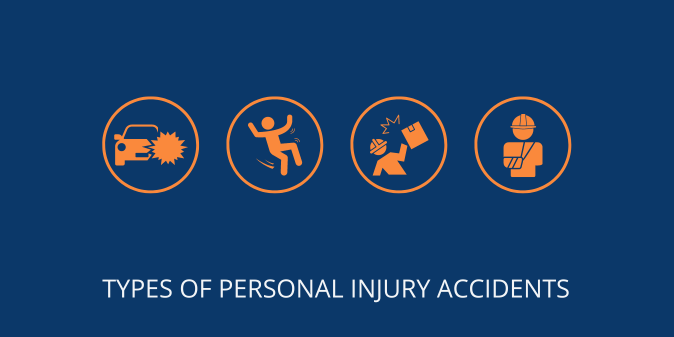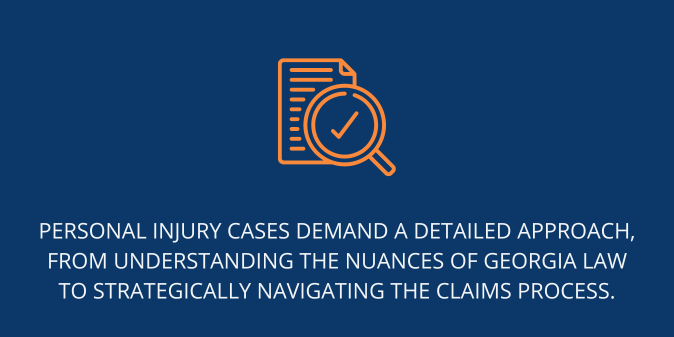Do You Have a Personal Injury Case?
In Georgia, navigating the complexities of personal injury law can feel overwhelming, especially following the stress of an accident. Understanding your rights and determining whether you have a valid personal injury case is crucial in seeking the compensation you deserve.
At The Law Office of Nicholas P. Martin, located in Dunwoody, we specialize in personal injury law, championing the rights of those harmed due to others’ negligence. With years of dedicated experience, our team stands ready to assess your situation, offering direct advice and robust legal strategies tailored to your case.
Whether you’ve suffered injuries from a vehicle collision, workplace accident, or any incident where another’s negligence caused harm, understanding the legal framework in Georgia is the first step towards justice.
We will guide you through the essential criteria for a valid personal injury claim, key considerations, and how to proceed with your claim.
The Four Parts of a Personal Injury Case in Georgia
In Georgia, as in other jurisdictions, a successful personal injury claim hinges on four critical components: duty, breach, causation, and damages. Understanding these elements is essential for anyone considering legal action following an injury.
This section breaks down each component, illustrating its importance in building a robust personal injury case.
Duty
The concept of duty refers to the responsibility one party has to avoid causing harm to another. In a personal injury context, this means that individuals or entities are expected to act with a certain level of care to prevent accidents or injuries. For instance, drivers have a duty to follow traffic laws, and property owners must maintain safe premises for visitors.
In Georgia, determining whether a duty existed often depends on the relationship between the parties and the circumstances surrounding the incident. If a duty can be established, the focus then shifts to whether this duty was breached.
Breach
A breach occurs when an individual or entity fails to meet their duty of care. This failure is not just about breaking a rule or law; it’s about actions or omissions that a reasonably prudent person would not make under similar circumstances.
For example, a driver running a red light breaches their duty to other road users, or a store failing to clean up a spill breaches its duty to shoppers.
To prove a breach in a personal injury case, evidence is key. This might include witness statements, surveillance footage, or accident reports. Establishing a breach is crucial, as it directly ties the defendant’s actions (or lack thereof) to the event that caused harm.
Causation
Causation links the breach of duty to the injuries sustained by the plaintiff. It’s not enough to show that the defendant acted negligently; you must also demonstrate that this negligence directly caused your injuries. Causation can often be the most complex element to prove, as it requires a clear line to be drawn from the defendant’s actions to the injury.
In Georgia, courts look for “proximate cause,” meaning the injury was a foreseeable consequence of the defendant’s actions. Medical records, expert testimony, and accident reconstruction can all play pivotal roles in establishing causation.
Damages
The final piece of a personal injury case is proving damages, which refers to the quantifiable losses you suffered because of the injury. Damages can be economic, such as medical bills and lost wages, or non-economic, like pain and suffering.
To secure compensation, you must provide concrete evidence of these damages. Receipts, employment records, and medical documentation are all critical in quantifying economic damages, while personal journals and expert testimony may help illustrate non-economic losses.
Proving damages is more than just a tally of costs — it’s about demonstrating the profound impact the injury has had on your life. It’s here that the true value of a personal injury claim is determined, emphasizing the importance of thorough documentation and competent legal guidance.

Types of Personal Injury Accidents
Personal injury accidents encompass a wide range of incidents, each with unique considerations under the law. Below, we detail the most common types of personal injury accidents.
Vehicle Accidents
Vehicle accidents stand as one of the most prevalent causes of personal injuries. These collisions involve cars, trucks, motorcycles, bicycles, and pedestrians. Fatal traffic accidents in Georgia have risenalmost 30% from 2012 to 2021.
Slip and Fall Accidents
Slip and fall accidents, often occurring on someone else’s property, represent another common type of personal injury claim. Property owners have a legal duty to maintain safe premises for visitors. When they fail, and someone is injured as a result, a premises liability claim can arise.
Medical Malpractice
Medical malpractice occurs when a healthcare professional deviates from the standard of care, causing harm to a patient. These cases can involve surgical errors, misdiagnoses, medication mistakes, and more. These injuries often include a mental component as you never expect to come out of the hospital or a medical care facility worse than when you entered.
Workplace Accidents
Workplace injuries are another significant category, encompassing incidents that occur in employment. In Georgia, theState Board of Workers’ Compensation provides resources and support for those injured on the job. While industries such as construction and manufacturing are traditionally associated with higher risks, workplace injuries can happen in any setting. In 2022, the most recent year full statistics are available,over 150 workers died on the job in Georgia, showing the severity of some types of accidents at work.
Product Liability
Injuries resulting from defective or unsafe products fall under product liability. This can include everything from faulty medical devices and pharmaceuticals to consumer goods. Holding manufacturers accountable requires demonstrating that the product was inherently dangerous or lacked adequate warnings.
Assaults and Intentional Acts
Personal injury claims can also stem from assaults and other intentional acts. Unlike accidents, these cases involve deliberate harm, adding a layer of complexity to potential legal proceedings. While criminal charges may be pursued, victims can also seek civil remedies for their injuries.

How to Get Compensation
If you’re navigating the aftermath of an injury in Georgia, understanding how to secure compensation is crucial. The process involves several types of compensation, each with specific requirements for proof. A knowledgeable Dunwoody personal injury lawyer can be instrumental in navigating these complexities.
Medical Expenses
Compensation for medical expenses covers both current and future medical treatments related to your injury. To claim this, you must provide detailed documentation of all medical costs, including:
- Hospital bills
- Prescription receipts
- Costs of physical therapy
Lost Wages
If your injury has forced you to miss work, you can claim lost wages. Proving this requires documentation from your employer detailing your absence and evidence of your usual earnings, such as pay stubs or tax returns.
A lawyer’s role here includes gathering the necessary proof and, if needed, working with financial experts to project lost future earnings, especially if your injury affects your long-term earning capacity.
Pain and Suffering
Pain and suffering compensation addresses the physical and emotional distress caused by your injury. Unlike medical expenses or lost wages, there’s no direct bill or receipt to quantify this. Instead, you’ll need to provide evidence of the extent of your suffering, which can include medical records, a personal journal, and testimony from family and friends.
Lawyers often leverage their experience to argue the value of pain and suffering, using similar cases as benchmarks to justify the amount.
Property Damage
If your personal property was damaged as part of the incident that led to your injury, you could be compensated for repair or replacement costs. You’ll need to present evidence of the property’s value and the damage incurred, such as repair estimates or receipts.
Punitive Damages
In cases where the defendant’s actions were particularly reckless or malicious, punitive damages may be awarded to punish the wrongdoer and deter similar behavior in the future. Proving entitlement to punitive damages demands showing clear and convincing evidence of the defendant’s misconduct. Punitive damages are rare.

Dunwoody Personal Injury Law Firm
The Law Office of Nicholas P. Martin stands as your dedicated partner in this journey. With a focus on assertive representation and direct, informative guidance, our firm is committed to advocating for your rights and working diligently to achieve the compensation you deserve.
Personal injury cases demand a detailed approach, from understanding the nuances of Georgia law to strategically navigating the claims process. Our skill ensures that every aspect of your case is meticulously handled, providing you with peace of mind during a challenging time.
Take the first step towards securing your justice and recovery. Contact The Law Office of Nicholas P. Martin right now for a free consultation. Our team is ready to assess your case, offer clear advice, and outline the next steps in your pursuit of compensation.
Remember, you don’t have to face this alone — professional legal support can make all the difference.
- Guide to Injury Assessment Post-Accident- March 28, 2025
- Navigating the Process of Car Injury Assessment- March 26, 2025
- How to Assess Injuries After a Car Accident- March 19, 2025